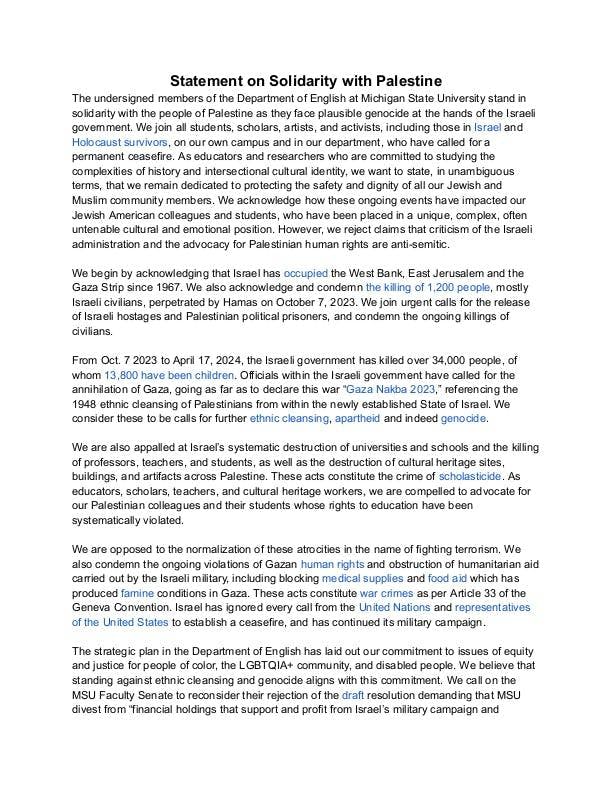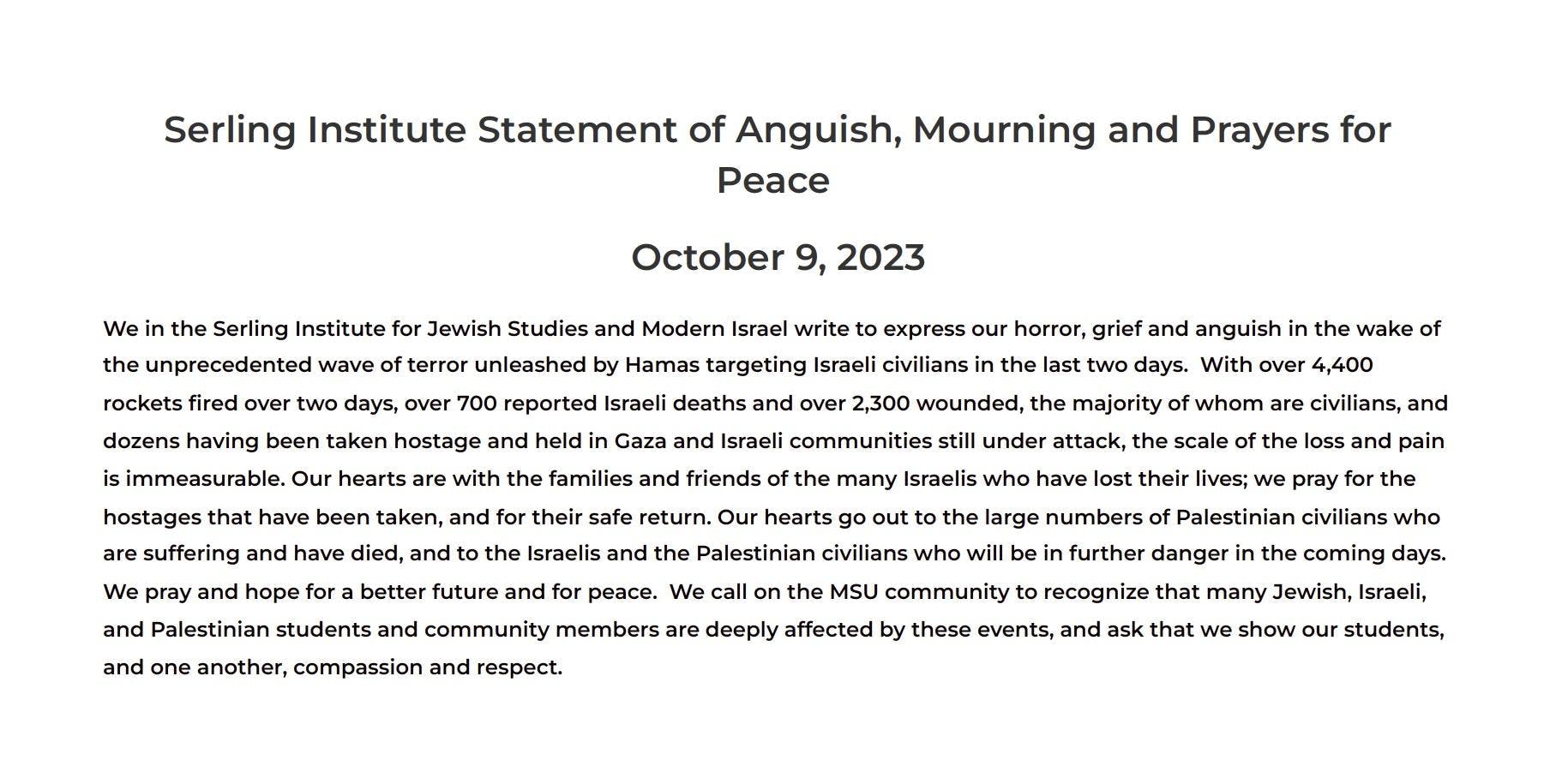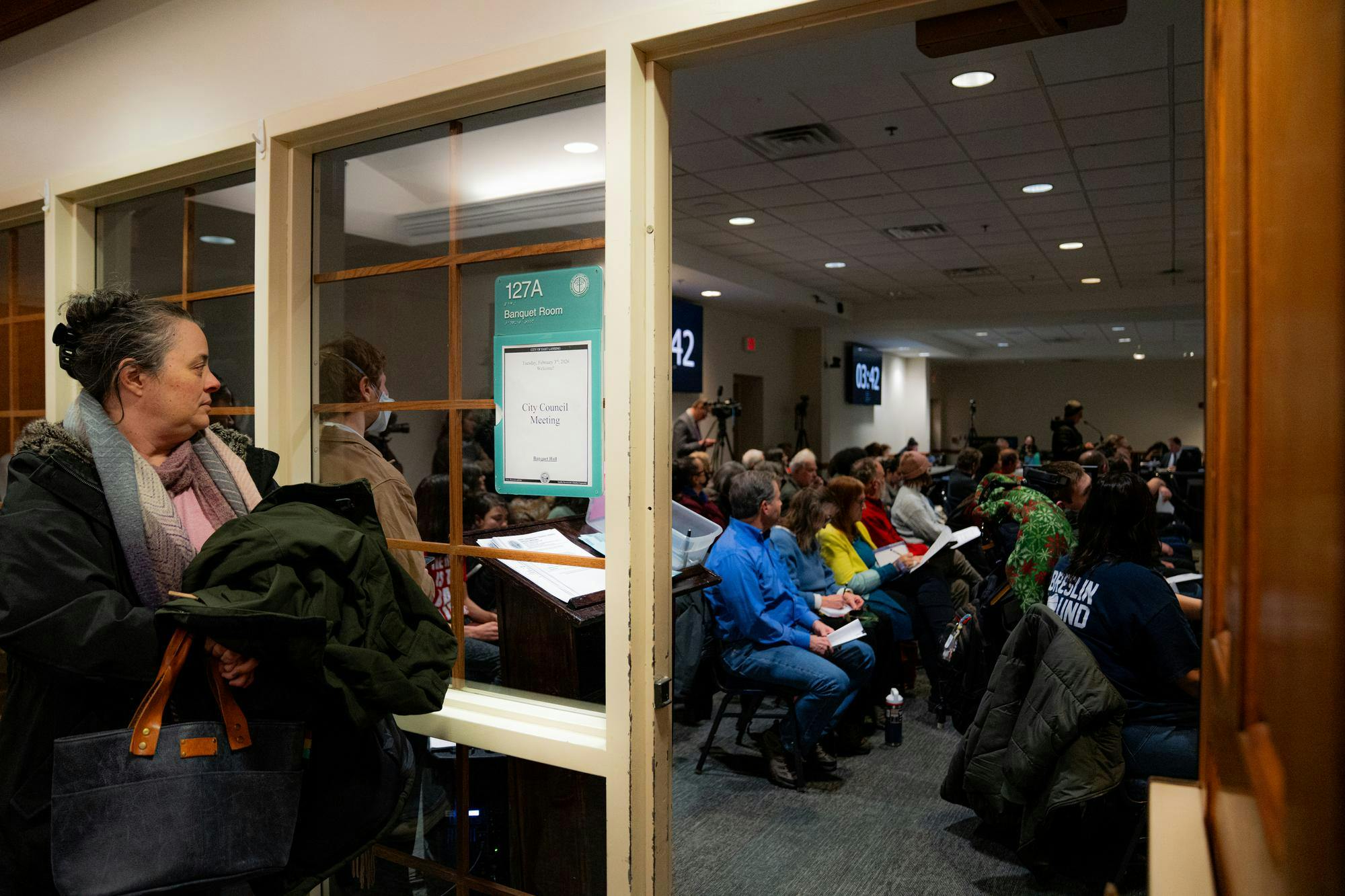As colleges across the country face continued scrutiny amid ever-heated debate of the Israel-Hamas conflict, many have opted for 'institutional neutrality' — formal policies that stop them from weighing in.
While Michigan State University has not made such a policy official, a growing list of actions show the university is already tapping into the popular playbook.
Earlier this month, MSU issued guidance to administrators explicitly describing the university’s "tone" on the issue as "neutral." When academic units have made statements that indicate otherwise, the administration has moved to efface them, The State News has learned.
Those practices could soon be formalized, a spokesperson said, with the university’s president and board discussing the matter.
Adopting a policy on neutrality would add MSU to a growing list of institutions committing to the trendy impartiality. Most recently, the University of Michigan joined the fray, with its board voting unanimously Thursday to adopt institutional neutrality, drawing mixed reactions.
Though popular, the policies have prompted problems for some. Enforcement brings new challenges, because, as one noted critic put it, there’s a fine line between restraining administrative power by stopping institutional speech and "expanding the administration’s authority to silence controversial speech."
What is institutional neutrality?
Modern institutional neutrality was conceived at the University of Chicago, said Tom Ginsburg, faculty director of their Forum on Free Inquiry and Expression. The principles were first developed by a faculty body in 1899, but formalized in a 1967 report, now a model for many colleges’ policies.
The specifics vary from one policy to the next, but most share a common thesis: colleges, and leaders speaking on behalf of them, will not take stances on political issues.
The benefit, as argued by supporters, is that colleges staying out of discourse supports the free expression of the scholars within them. If institutions don’t take stances, faculty are most free to develop and advocate for their own, they contend.
"The word 'neutrality' puts a lot of people off," Ginsburg said. "Some people think it means I can’t speak up about X or Y, but it’s quite the opposite."
The idea is especially salient in recent years, Ginsburg argues, as colleges have succumbed to pressure from "social justice advocates" who demand institutions speak out on various issues.
"'Silence is violence,' they’ll say," he said.
MSU, for example, issued statements on the Black Lives Matter movement, Jan. 6 insurrection, and Russia’s invasion of Ukraine.
That practice has become more complicated in the last year, as campuses have been divided by heated debates on the Israel-Hamas conflict. Some colleges’ leaders have found themselves embattled after their statements upset people on one — or sometimes both — sides of the debate.
Those tensions have pushed some colleges to adopt policies of institutional neutrality, ending all the statements and absolving leaders of the perilous politics.
It’s unclear how such a policy would come about at MSU. It’s varied at other colleges, with some coming directly from administrators and others enacted through formal votes of governing boards.
In past presidencies, whether or not to issue a statement was influenced by a "formal guidance document" maintained by the university’s communications department, said MSU spokesperson Emily Guerrant.
Now, President Kevin Guskiewicz is discussing a new policy with MSU’s Board of Trustees, she said, noting that nothing has been finalized.
'Neutrality' in a communications plan
Support student media! Please consider donating to The State News and help fund the future of journalism.
A recent "communications plan" sent to college deans, program directors and department chairs offers one glimpse into how MSU is attempting to use neutrality to navigate contentious issues.
The document, which was obtained by The State News, attempted to prepare campus leaders for the one-year anniversary of Hamas’ Oct. 7, 2023 attack on Israel.
It begins by providing "background" on the conflict and noting an increase in antisemitism and Islamophobia since Oct. 7, 2023, "coupled with increased scrutiny over how protests and related incidents are handled on campus."
The next section, labeled "tone," details MSU’s approach to avoiding that scrutiny. It includes a bullet point reading, "Neutrality: MSU does not make political statements."
Later in the communications plan is a section labeled "divestment points," apparently included in relation to continued calls on campus for MSU to cut its financial ties with Israel and associated companies and institutions. The section suggests that divesting from Israel would risk MSU’s commitment to neutrality.
"Universities have a mission to foster academic freedom and open dialogue," the statement said. "Taking sides in international conflicts through divestment could undermine this mission by appearing to favor one perspective over another, potentially stifling open academic debate and inquiry."
The communications plan also seems to address parallels drawn by activists between the current push for divestment from Israel and the ultimately successful campaign for MSU’s divestment from apartheid South Africa in 1978. Organizers have said that successful effort serves as inspiration for today’s movement and evidence that divestment is possible.
But MSU’s communications plan provides advice on countering that line of reasoning.
"The Middle East conflict, particularly the Israeli-Palestinian issue, is deeply complex with historical, political, religious and social dimensions that differ significantly from the South African apartheid era," the communications plan said. "This complexity makes the situation less straightforward in terms of institutional divestment."
The plan also said divestment from South Africa was "based on the historical context of the time and was a process that took many years."
Removed department statements
Along with the guidance pushing for neutrality, MSU has cracked down on departments straying from it.
The administration has requested the removal of at least two "department statements" on the Israel-Hamas conflict, The State News has learned.
Those sorts of statements present a challenging "gray area" for universities attempting institutional neutrality, as they can make it unclear where faculty speech ends and institutional expression begins, said Ginsburg, the UChicago professor and expert on institutional neutrality.
As MSU sees it, those sorts of statements are not protected by academic freedom, said Guerrant, the spokesperson.
"There is a difference between expressing their individual viewpoints (in the classroom, on a social media platform, at a protest or in a personal letter written to a lawmaker) vs putting a statement up on university websites that indicate a position by the university," she wrote in an email to The State News.
But, some of the involved faculty said they disagree, especially when they see a close relation between the current conflict and their field of study.
Kristin Arola, the director of the American Indian and Indigenous Studies Program, said she was contacted by the dean of her college to remove a statement titled "CEASEFIRE NOW" from the department’s website. Documents reviewed by The State News corroborate her account.
In the request that the statement be removed, Arola said her dean cited guidelines for faculty members around "civil discourse" posted to the Office of the Provost’s website that say "academic and administrative units should use university webpages to provide information about the unit itself, its programs, its staff, and other information related to the unit."
The guidelines continue that "employees may not make personal statements unrelated to university business on behalf of the university" using department websites.
But Arola — who said she "pushed back" on her dean’s request and has a meeting scheduled with her to seek "clarification" — argued that the statement in question does, in fact, directly relate to the unit, and therefore would seem to be allowed under the neutrality guidelines.
"I actually believe our statement, and the way it's written, has to do with the business of our unit," Arola said, citing a portion of the statement which discusses "parallels between the struggles of Indigenous communities and the plight of the Palestinian people."
However, Arola added it’s difficult to know for sure if the statement would be allowed under the guidelines given a perceived vagueness in its language.
"I’m very unclear where the lines are right now, and I think the university — I don’t think they’re clear either," she said. "I think they just don’t want to get in trouble."
But, even if she accepted the premise that the guidelines, as they stand, would prohibit her department from displaying the statement, Arola said she questions whether restricting departments from taking stances is the right thing to do.
"I’m not an overly political person in my classroom," she said. "...I’m never going to go into a classroom and tell my students who, or what, to vote for. I think maybe the university is worried about that right now, or something. But I think I can still be that professor who’s not telling them what to vote for and still stand for a ceasefire, and for peace."
"I don’t see those as incommensurable."
MSU’s Department of English was also asked to remove a statement on the conflict.
During the spring semester, 28 members of the department signed a "Statement on Solidarity with Palestine" which was posted on their university website.
It said the undersigned professors "stand in solidarity with the people of Palestine as they face plausible genocide at the hands of the Israeli government." It also condemned the Oct. 7, 2023 attack on Israel by Hamas and called for the release of the Israeli hostages taken captive.
The statement also voiced support for a failed Faculty Senate resolution calling on MSU to divest from financial holdings which activists argue support Israel and the war.
The statement remained on the department’s website for months, and then was taken down in September without the department’s knowledge, according to professor Joshua Yumibe and two other members of the department who wish to remain anonymous.

There were then negotiations about the statement with MSU’s provost, the dean of the College of Arts and Letters, and MSU’s communications department, according to emails reviewed by The State News.
In the end, they agreed that the statement would be moved to Humanities Commons, a pseudo-social-networking site used by academics to share their work, the emails show. It would also now include a disclaimer saying that it was not representative of the views of the department, college, or university, according to the emails.
The Michael and Elaine Serling Institute for Jewish Studies and Modern Israel also appears to have had statements posted to its website recently removed, though it's unclear if the removal was prompted by direction from university leadership.
An archived version of the department’s website shows that as recently as June, the department had a page on its website labeled "statements." It included a statement of grief for the killing of innocent Israelis dated two days after Hamas’ Oct. 7, 2023, attack on Israel, and a statement from March 2023 expressing support for Israelis protesting legislative efforts of Prime Minister Benjamin Netanyahu that would "weaken Israeli democracy."
That statements page is not on the Serling Institute’s current website. Serling Institute Director Yael Aronoff declined to comment.




